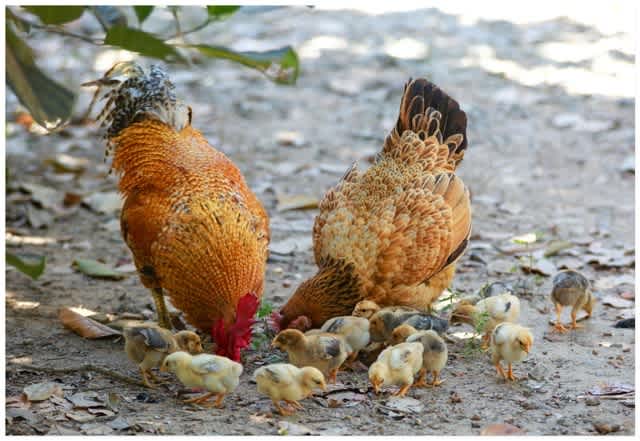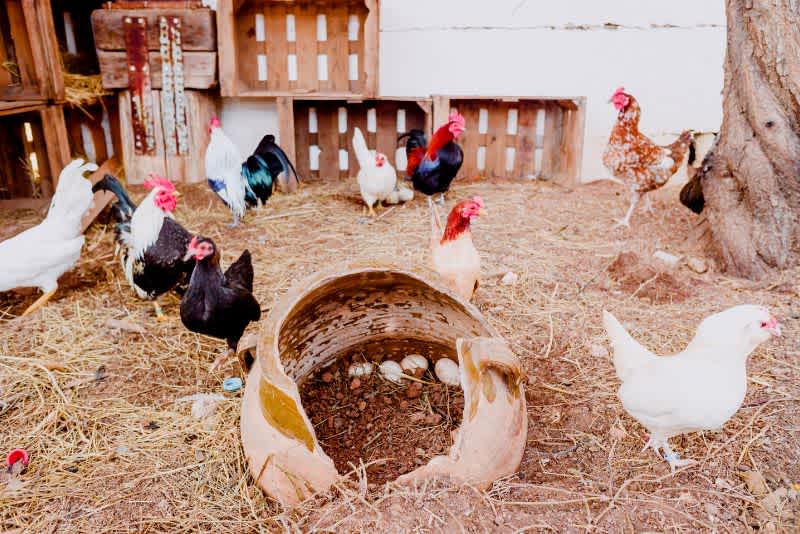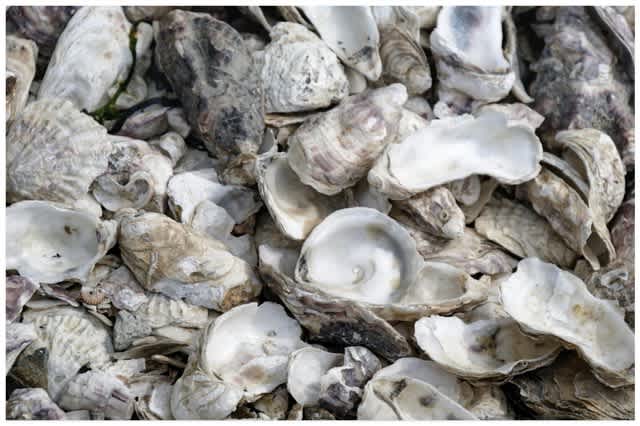Can Chickens Safely Eat Cheese? The Surprising Answer
Published: July 12, 2024

You might be curious about whether your feathered friends can enjoy cheese as part of their diet. While cheese does offer beneficial nutrients like proteins and calcium, there's a balance to be struck due to its high fat and sodium content.
Offering cheese in moderation could support your chickens' health, but overdoing it might lead to unwanted issues. How do you determine the right amount, and what types of cheese should you avoid?
Understanding these nuances can ensure you're providing a safe, nutritious treat for your free-ranging chickens.

Nutritional Content of Cheese
Cheese, including cottage cheese, is packed with essential nutrients like protein, calcium, and vitamins that can benefit chickens in moderation, making it a potentially healthy snack.
When you look into the cheese composition, you'll find that it's a rich source of proteins, which support your chickens' muscle development and overall health. Along with proteins, cheese also provides a good amount of calcium, a mineral that's vital for strong eggshell formation and bone health.
Understanding cheese digestion in chickens is equally important. Chickens have a different digestive system compared to humans, and they lack the enzyme lactase, which is necessary for breaking down lactose found in dairy products. Therefore, you should be cautious when feeding cheese to your flock. Opting for low-lactose or lactose-free cheese varieties can help mitigate potential digestive issues.
Cheese also contains vitamins such as vitamin A and B-complex, which contribute to maintaining healthy skin, feathers, and overall vitality of your chickens. However, cheese is high in fat and sodium, which means it should only be given as an occasional treat rather than a regular part of their diet. Excessive fat can lead to obesity, while too much sodium can cause health problems.
Benefits of Cheese for Chickens
Despite the need for moderation, including cheese in your chickens' diet can offer several benefits. Hens require ample calcium to produce eggshells, and a lack of this mineral can lead to weak or malformed eggs. By providing your chickens with small amounts of cheese, you can help ensure they receive the necessary calcium to lay healthy eggs consistently.
Chickens, especially free range ones, need protein for muscle development, feather growth, and overall vitality. A protein boost from cheese can be particularly beneficial during molting season when chickens lose a lot of feathers and require extra nutrients to grow them back. Including cheese in their diet can help meet their protein requirements and keep them in peak condition.
Cheese also supports digestive health and can be part of a balanced chicken’s diet, alongside their regular commercial diet. While chickens primarily eat grains, vegetables, and insects, adding a bit of cheese can introduce beneficial bacteria that aid in digestion.
These bacteria can help break down food more efficiently, leading to better nutrient absorption and overall health. However, remember that moderation is key, as too much cheese can overwhelm their digestive system.
Potential Risks of Cheese
Just like how you would monitor commercial feed, it's important to be aware of the potential risks that cheese poses to your chickens. One major concern is cheese allergies, which can affect both backyard chickens and commercial ones.
Allergies in chickens can manifest as respiratory issues, skin irritation, or even more severe reactions that could compromise their health. Monitor your flock for any signs of discomfort or adverse reactions when introducing cheese into their diet.
Another significant risk is digestive issues. Chickens don't have the same digestive systems as mammals, and their bodies aren't designed to handle large amounts of dairy. Cheese, being a dairy product, can be tough for them to break down efficiently, unlike easily digestible foods such as white rice.
Overconsumption can lead to digestive distress, including diarrhea, and bloating. These issues not only cause discomfort for your chickens but can also lead to dehydration and other health complications if not addressed promptly.
Moreover, cheese is often high in fat and salt. While a small amount mightn't seem harmful, consistently feeding cheese to your chickens can lead to weight gain and other health problems associated with a high-fat diet. Excessive salt intake can also be dangerous, potentially causing electrolyte imbalances and kidney issues.
Lastly, there's the risk of contamination. Cheese that's left out too long can develop harmful bacteria or mold, posing additional health risks to your chickens. Always ensure any cheese you offer is fresh and free of contaminants.

How Much Cheese Is Safe
When considering how much cheese is safe for your chickens, start with very small amounts to observe their reactions.
Offer no more than 1-2 small cubes (about 1/2 inch) of cheese per chicken, 2-3 times per week
Chickens can be sensitive to new foods, and cheese is no exception. Begin with a tiny cheese portion, around the size of a pea, for each chicken. This allows you to monitor any adverse reactions or digestive issues.
Once you've determined that your chickens can handle this small amount, you can gradually increase the portion, but always in moderation. Cheese should never constitute a significant part of their diet (over 10%), but can be offered as an occasional healthy treat to boost their immune system.
Stick to a cheese portion that's just enough to be a treat, not a meal replacement. Balancing their diet with plenty of grains, vegetables, and proteins will keep your chickens healthy and happy.
Additionally, always observe how your chickens react after consuming cheese. If you notice any signs of distress, such as diarrhea or lethargy, discontinue feeding cheese immediately. Your chickens' health should always be your top priority.
Types of Cheese You Can Feed Chickens
While we do offer some suggestions, it is always best to check with your vet before starting any diet changes.
Cheddar cheese
Gouda cheese
Mozzarella cheese
Goat cheese
Cottage cheese
Types of Cheese to Avoid
Not all cheeses are safe for your chickens, so it's important to know which types to avoid. Certain cheese varieties can be harmful due to their ingredients, textures, or high-fat content, while others like goat cheese may offer unique health benefits.
Soft cheeses: These tend to have higher lactose content, which can be harder for chickens to digest. Examples include:
Brie
Camembert
Cream cheese
Ricotta
Fresh mozzarella
High-salt cheeses: Excessive salt can be harmful to chickens. Avoid or strictly limit:
Feta
Blue cheese
Halloumi
Processed cheese slices or spreads
Moldy cheeses: While some mold is intentional in certain cheeses, it's best to avoid giving chickens any moldy dairy products (afterall who wants moldy food ?). This includes:
Blue cheese
Gorgonzola
Roquefort
Flavored or seasoned cheeses: These often contain additional ingredients that may not be suitable for chickens, such as:
Cheese with herbs or spices
Cheese with added garlic or onion (which can be harmful to chickens in large quantities)
Full-fat cheeses: While not strictly harmful in small amounts, high-fat cheeses should be limited to prevent obesity in chickens. Examples include:
Triple cream cheeses
Some aged cheddars
Alternatives to Cheese
If you're looking for healthier treats for your chickens, consider offering them fresh fruits and vegetables as alternatives to cheese. Chickens love a variety of produce, such as bell peppers and sweet potatoes, which can provide essential nutrients like vitamin C and vitamin B without the drawbacks of dairy.
Apples (without the apple seeds), berries, and leafy greens (in moderation due to oxalic acid content) are all excellent choices that can keep your flock happy and healthy.
Besides fruits and veggies, you should also think about integrating other protein sources into their diet. Chickens need protein for feather growth and egg production, so offering cooked eggs, mealworms, or even fish can be beneficial. These protein-rich foods can be a great substitute for cheese, which, while tasty, doesn't provide the same nutritional benefits.

Calcium supplements are another important consideration. Cheese does contain calcium, but it's not the best source for your chickens. Crushed oyster shells or even ground-up eggshells are excellent calcium supplements that can help maintain strong eggshells and overall bone health, unlike coffee grounds which should be avoided.
You can easily mix these into their regular feed or offer them separately to ensure your chickens are getting the calcium they need.
It's also worth mentioning grains and seeds as part of a balanced diet. Whole grains like oats, barley, and quinoa can provide essential nutrients and keep your chickens' digestive systems in good shape. Sunflower seeds and pumpkin seeds are other fantastic options that offer both protein and healthy fats.
Observing Chickens After Eating Cheese
After feeding your chickens cheese, closely monitor their behavior and health to ensure they don't experience any adverse reactions. It's important to observe any changes in chicken behavior immediately after cheese consumption. Chickens are curious creatures, and their reactions can tell you a lot about how well they're digesting the new treat.
First, pay attention to their energy levels. If they seem lethargic or unusually hyperactive, it might indicate an issue. Also, check their droppings for any signs of digestive distress. Loose stools or diarrhea can signal that cheese isn't agreeing with their system. Proper digestion is key to maintaining your chickens' overall health, and any disruptions should be taken seriously.
Next, keep an eye on their eating habits. If they suddenly show less interest in their regular feed, it could be because cheese is too filling or rich for them. Chickens need a balanced diet, and overindulgence in cheese can lead to nutritional imbalances. Make sure cheese consumption doesn't replace their staple food.
Additionally, watch for any signs of respiratory distress or allergic reactions. Although rare, some chickens might be allergic to certain components in cheese. Symptoms like wheezing, coughing, or swelling should be addressed immediately.
Choose the right chicken feed
So, can chickens eat cheese? Absolutely, but in moderation. Remember, a little cheese can offer valuable nutrients like proteins and calcium.
Did you know that just one ounce of cheddar contains about 7 grams of protein? That's a tasty boost for your chickens! Just be cautious and watch for any signs of digestive issues or allergies.
Stick to small portions once or twice a week, and your chickens will thank you for the occasional cheesy treat!
Keep track of all your cattle with the #1 Cattle Management Software
Try out Ranchr today for free